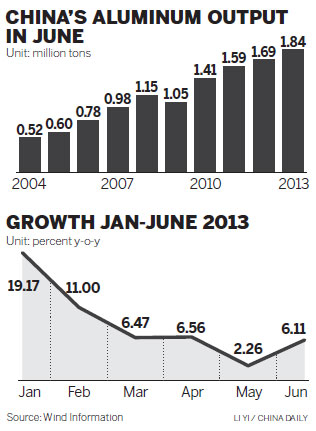Aluminum producers staggering as factories lack orders
 0 Comment(s)
0 Comment(s) Print
Print E-mail China Daily, August 27, 2013
E-mail China Daily, August 27, 2013

China has invested substantial sums in raw material production such as electrolytic aluminum projects, driven by global demand, but the industry faces serious excess capacity, experts said.
During the first half, China's nonferrous metals refining industry experienced "severe" overcapacity, rising power costs and falling aluminum prices, according to a report released by the National Development and Reform Commission, China's top planning agency, in mid-August.
It said smelting capacity was "extremely excessive", with a lack of stable resource supply. Yet the industry doesn't produce enough high value-added products, which must still be imported.
Because there's so much excess capacity, many electrolytic aluminum producers are short of orders, said Xu Yongbo, chief analyst of the metals industry at JYD Online Corp, a Beijing-based bulk commodity consultancy.
He said that many companies didn't look ahead to the possibility of shrinking demand when they started investing in the industry a few years ago. One option could be "for these producers to turn to the high-end aluminum market, which still has big potential. However, it costs too much to upgrade their production lines," he said.
In the first half, the electrolytic aluminum industry lost a combined 670 million yuan ($109 million), forcing several enterprises in central and eastern China to suspend production, according to the Ministry of Industry and Information Technology.
Based on the 12th Five-Year plan (2011-15) for the nonferrous metal industry released by the ministry, domestic electrolytic aluminum output must be capped at 24 million tons per year by the end of 2015.
But data from the China Nonferrous Metals Industry Association shows that China's electrolytic aluminum output in the past year already reached 20.3 million tons and production capacity stood at 26 million tons.
The combination of excess capacity and rising electricity prices - which account for about 45 percent of production costs - led to bitter competition and falling prices.
The sales price of electrolytic aluminum has been below production costs since August 2011.
Market data show that aluminum prices fell 9 percent year-on-year to 14,700 yuan a ton in June this year, according to the NDRC.
In 2012, the national average selling price of electrolytic aluminum was 15,636 yuan a ton, while the average production cost reached 16,200 yuan a ton, putting 93 percent of producers into the red.
The government has taken several steps, including setting a cap on total output, monitoring financing for the industry and environmental standards for new projects. In line with the national policy, four electrolytic aluminum producers with a total capacity of 260,000 tons were ordered to close in 2013. All four are in Henan province, which account for about one-quarter of China's electrolytic aluminum output.
Producers in the province face multiple challenges including soaring production costs, declining product prices, shrinking demand and rising inventories.
However, Xu said the "Henan dilemma" is overtaking the industry nationwide.
To cut production costs, many companies are moving their plants from eastern areas with higher electricity rates to western regions such as Gansu province and the Xinjiang Uygur autonomous region. These local governments welcome the investments, which can push up their local GDP levels.
However, the NDRC said, some new electrolytic aluminum projects "did not abide by State rules in western China", though it didn't give further details.
Xu said that relocation for short-term benefits was unwise.
"These companies might make money for one or two years because of cheaper electricity rates and incentives offered by local governments," he said. "But then what? Without core products with competitiveness, it's still a dead-end."






Go to Forum >>0 Comment(s)